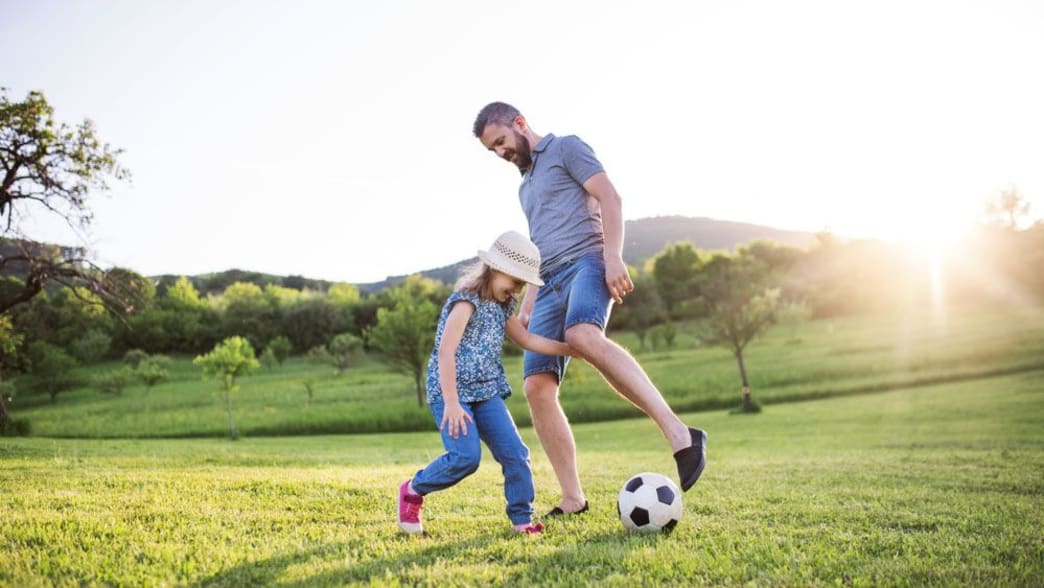
Focus on “what’s going to make you smile” to make long-lasting changes to your fitness (and lose weight), says PT Tim Hayes.
When you’re about to embark on a fitness kick, perhaps the two most important questions you should ask yourself are what you want to get from it and how can you ensure that you stick with it for life, rather than just a couple of weeks.
When it comes to stickability in particular, opting for an extreme short-term fitness regime can be counterproductive, because while the immediate results can be impressive, it’s harder to sustain that effort level in the long term.
Tim Hayes is a personal trainer and the creator of Peach, an app that connects Londoners with personal trainers. Over the course of his 15-year career Hayes has noticed that more and more clients come to him with aesthetic targets, often fuelled by insecurities fed by social media sites like Instagram. We spoke to Hayes about the change he’s seen in the fitness industry, and what fitness goals he thinks would be more productive.
What are the most common goals set by people you work with? Have these changed during your career?
I work all over the world and generally in coastal cities the focus is much more on aesthetics. In recent times I feel such clients have become much more obsessed and self-critical about how they look. I’ve had somebody sending me pictures of Instagram models asking me to give her a similar body. I had to point out that as a 45-year-old mother of three with her own company who can train three times a week max, trying to make her look like a 21-year-old Victoria’s Secret model was only going to result in frustration for us both.
On the other end of the scale, there has been a shift towards becoming strong and not focusing on being skinny after the hashtag #strongnotskinny started doing the rounds. This has meant clients have more meaningful goals, which in turn creates a more realistic and subtle change in their lives. This is definitely a step in the right direction, but I feel the fitness marketing engines need to look long and hard at what they are selling. I still see far too many personal trainers and products advertising 12-week body transformations, when there needs to be a much bigger focus on being fit and strong for long-term health.
Looking good is a reasonable goal to have – why is a performance-based goal better?
Society says we need to look like a front cover fitness model to have self-worth, and the fitness industry says regardless of who you are and what your fitness levels are, you can achieve this in three months relatively easily. Changing a mindset to implement a long-term healthy lifestyle changes takes time. Focusing on a three-month weight loss plan or aesthetic goals usually feels like some kind of punishment or penance for the client and totally out of context from their usual lifestyle – it’s why so many gym members end up not going.
Creating goals that focus on how we perform in a session, how we move and how we feel are easier to carry over to our daily lives and change how we eat, sleep and manage stress and daily routines. It’s a crucial part of getting fit and staying fit. The results will naturally yield weight loss out of a generally healthy lifestyle but taking the focus away from that creates a more powerful and positive experience.
We had a client who wanted to lose weight, but when we met him we found out that he had knee pain and what was most important to him was playing football with his son in his garden and going skiing with his family at Christmas. Instead of weighing him we focused on improving his mobility to reduce his knee pain and getting his body performing optimally. He now plays football with his son, he went skiing at Christmas, he loves training and of course he lost a load of weight as a result.
What kind of performance-based goals are good for people when they start a fitness regime?
Our consulting process is very individual. We need to understand exactly who our client is, what’s going on in their life now, what’s happened previously, and where they want to go to and why. So it’s probably better I answer that question with an example rather than specific exercises.
I had a client who came to me for weight loss, because that’s what she thought trainers wanted to hear. During her consultation we discovered running 5K faster was really important to her. She also attended a yoga class but couldn’t do a handstand and some other poses, so we looked at those and started to build exercises specifically to get her stronger for that. She now has a clear running plan, her 5K times continue to improve and soon she will start increasing her distance. And she walks into the yoga class with her head held high as she’s now able to smash handstands with no support, as well as get into other poses she never thought possible.
So my answer to your question would be to let go of weight loss. Think about what you want to achieve, what would make you smile, what would raise your self-esteem, and then focus on getting stronger at that.
What effect do you think fitness “influencers” have had on the fitness and wellness industry?
It really depends on who you follow. There’s definitely a shift in what defines self-worth, which is great to see. On the other side there’s an abundance of stick-thin influencers, fitness models and Instagram trainers posting before and after pictures all focusing on looks alone. If you have any insecurity at all, it’s easier than it ever has been to be sucked into this world. More and more I see the younger generation especially becoming obsessed with how they look, and I know eating disorders are still on the rise which is very sad. It’s partly why I created Peach – to change people’s perception of what fitness is about and help people overcome their insecurities.
I have nothing against wanting to look good – we all do and there is nothing wrong with that, but our focus should be on longer-term more sustainable results. There are no quick fixes so I would stay well away from any company promising to change your life and your body in 12 weeks, or trainers claiming to have magical pills, machines or exercise to get killer abs in 30 days. Fitness is about changing your whole life, not just 12 weeks of it.
Written by Nick Harris-Fry for Coach and legally licensed through the Matcha publisher network. Please direct all licensing questions to legal@getmatcha.com.


